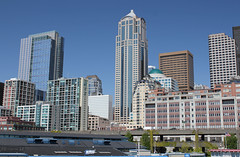As you can see from these terms, commercial real estate has a “lingo” all it’s own and you must learn to speak that language if you are going to succeed in this tricky investment field. Here is a breakdown of some of the more common commercial real estate terms you will encounter and how to put them to use in making an offer.
“Capitalization Rate”
Also known as “cap rate”, this is used as a measure of a properties performance without considering the mortgage financing. If you paid all cash for the investment, how much money would it make? What’s the return on your cash outlay? Cap rate is a standard used industry wide, and it’s used in many different ways.
For example, a high cap rate usually typifies a higher risk investment and a low sales price. High cap rate investments are typically found in poor, low-income areas. A low cap rate usually typifies a lower-risk investment and a high sales price. Low cap rates are typically found in middle to upper income areas.
“Cash Flow”
Positive “cash flow” is the goal of every commercial real estate investor. Positive cash flows means you are taking in more money than you are spending on your investment. It creates and maintains your investment’s momentum and generates income you can use to live on and/or invest into other properties.
| Seattle's Commercial Real Estate (Photo credit: Canadian Pacific) |
“Cash-on-Cash return”
Also known as the “velocity” of your money, this term basically refers to the amount of time it takes for the money you invested into a property to come back to you. For example if your down payment on a property was $25,000, Cash-on-Cash return is the time it takes for your monthly cash flow to add up to that $25,000 investment. If it took one year to accomplish this then your cash-on-cash return would equal 100%. If it takes two years to accomplish this then your cash-on-cash return would equal 50%, and so on. Cash-on-Cash returns of over 100% are not uncommon in commercial real estate investing and is one of the main attractions it has to investors. What other investment vehicles can give you that kind of return on your money?
“Net Operating Income (NOI)”
This is one of the most important terms in commercial real estate investing when you are analyzing the profitability of any deal. The NOI is the dollar amount that’s left over after you collect all of your income and pay out your operating expenses. This amount is what is left over to pay any financing you may have on the property. Always pay attention to your NOI and look for ways to increase it by either raising rents or lowering expenses. As your NOI increases so does the value of your property.
Now that you know some of these basic terms you can calculate what a commercial real estate investment should cost. The formula is “sales price = NOI ÷ cap rate. So for example if the NOI is $57,230 and you want to make investments into 9 percent cap properties then the price you should offer is $635,889. (57,230÷ 9%) This is a good place to start you first offer on the property.
Daniel Doran is a 20+ year veteran in the real estate industry. He is a previous owner of a law firm, mortgage and title company. Daniel has also written several books on mortgage modification, short sales and real estate investing. He currently specializes in Commercial Finance and Real Estate Development and is a graduate of Manhattanville College and Brooklyn Law School. You can contact Dan at Buildings By Owner
Taken from: .http://realtybiznews.com/common-commercial-real-estate-terms-explained/98714459/






No comments:
Post a Comment